“A Day in the Strife”
Written by J. Michael Straczynski
Directed by David J. Eagle
Season 3, Episode 3
Production episode 303
Original air date: November 20, 1995
It was the dawn of the third age… Sheridan and Ivanova are having a meeting with the Transport Pilots Association, which is loud and raucous and completely unproductive. One pilot mouths off at Sheridan, accusing the captain of hoarding weapons, while all he has is a metal rod, and it’s easy for Sheridan while sitting up at the podium. So Sheridan goes down into the crowd and gives the guy a PPG and takes his metal rod. When actually given the opportunity to put his money where his mouth is, the guy backs down rather quietly. (Sheridan had removed the power cell from the PPG he handed the guy, just in case he read him wrong.) Sheridan calls a recess.
Counselor Na’Far arrives from Narn, along with his bodyguard, Ta’Lon (the Narn who was also kidnapped by the Streib with Sheridan). He has been sent by the Centauri to replace G’Kar. Sheridan, however, will not withdraw G’Kar’s asylum. If Na’Far wants G’Kar to leave, he’s got to convince G’Kar to do it himself.
Garibaldi and Franklin are sharing a drink at Earhart’s. Franklin is exhausted, and isn’t even willing to ask a woman who’s obviously interested in him to dance. He’s then informed that he needs to work an additional shift in medlab and exhaustedly agrees to be there in two hours. He goes off to the bathroom, and when he comes back he’s full of vim and vigor and asks the woman to dance.
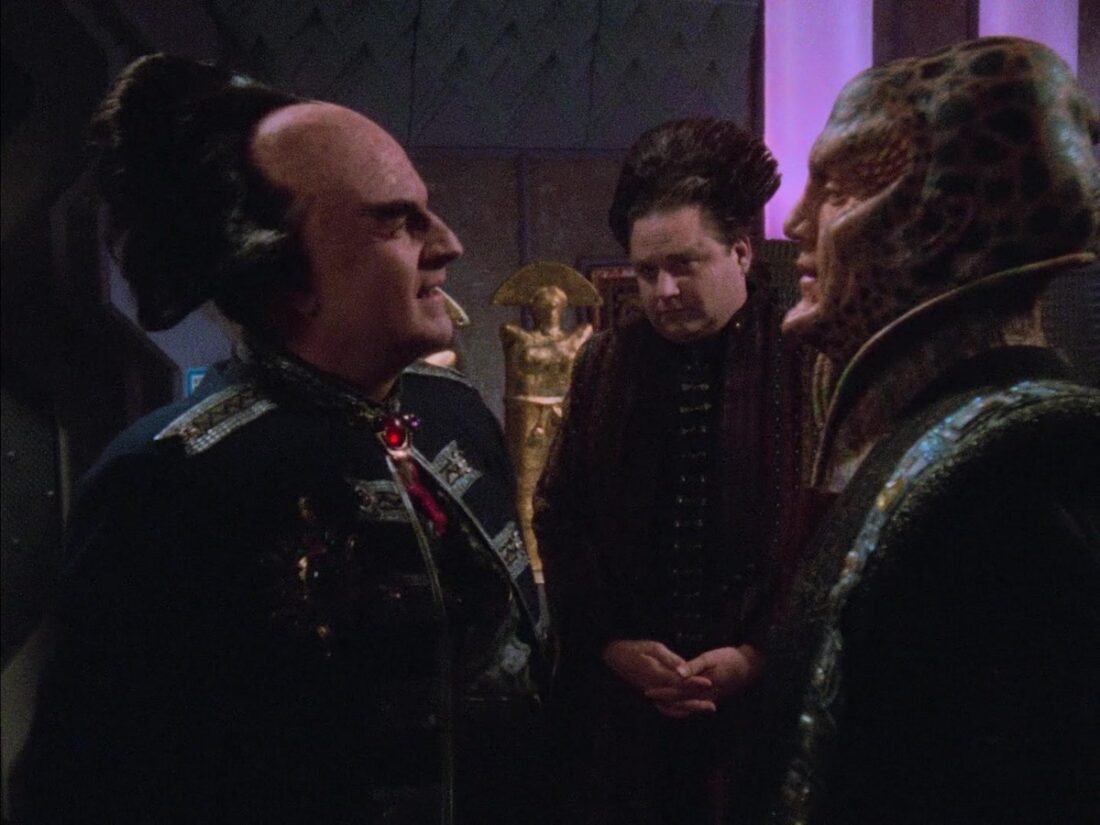
Na’Far reports to Mollari, asking the ambassador permission to speak directly to G’Kar. Mollari eventually accepts it but makes sure to humiliate the Narn in general and Na’Far in particular as much as he possibly can first. After Na’Far departs, Vir expresses his disgust with Mollari’s kicking the Narn while they’re down, and Mollari’s response is that that’s the only way they’re going to stay down.
A probe of unknown design shows up in the system, sending a signal. Corwin starts the process of decoding it.
Mollari calls in the favor Delenn owes him, asking for Vir to be reassigned to the Centauri embassy on Minbar, which has been closed for some time due to the previous ambassador making an ass of himself. Mollari assures Delenn that Vir will be completely inoffensive and won’t even play politics, as he would consider it impolite. Delenn agrees. Vir does not, as he doesn’t want to go to Minbar and doesn’t want to leave Mollari alone, but Mollari insists.
Garibaldi invites Franklin over for dinner, where the alcoholic security chief confronts the doctor about what may be an abuse of stims. Franklin admits that he’s been using stims, but not abusing them, and he promises to cut back if it’ll make Garibaldi happy.
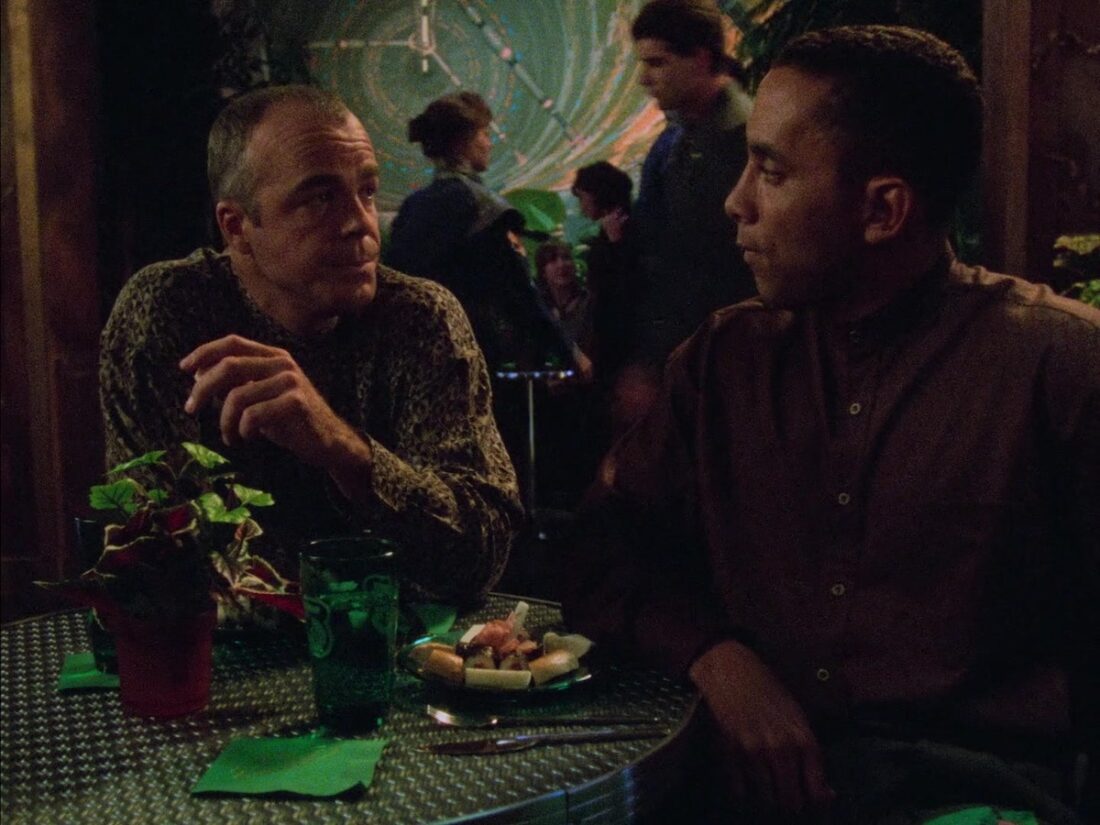
Ta’Lon and Sheridan share a drink and talk about what they’ve been doing with themselves since they were abducted by the Streib. Ta’Lon says he is in Sheridan’s debt, and he also laments that he’s not sure if he’s protecting Na’Far from outsiders or from other Narn.
The probe’s message is a series of questions about various scientific disciplines. If they answer everything right, they’re worthy of first contact, and the aliens will provide the cure to every known disease. If they don’t answer everything right, the probe will blow up and take half the star system with it. They have one day.
The countdown started once the message was decoded, which was kind. Ivanova informs Sheridan that they can’t get at the probe’s insides to even try to deactivate the bomb. So they scramble to get answers to the questions.
Na’Far tries to convince G’Kar to return to Narn, and also to scale back the rebellious activities. The guerrilla attacks on the Centauri are keeping food from getting to Narn. G’Kar rejects the notion, as the Centauri are manipulating them into stopping their rebellion. Na’Far preaches patience, for the rebel cease-fire to be a temporary one, to give the Narn a chance to heal and the Centauri to develop a false sense of security. When G’Kar points out that the Narn on B5 need a leader, Na’Far offers himself. G’Kar laughs in his face; the Narn on B5 will never trust a Narn sent by the Centauri.
Then the other shoe drops: if G’Kar doesn’t return to Narn, the families of the Narn on B5 will suffer.
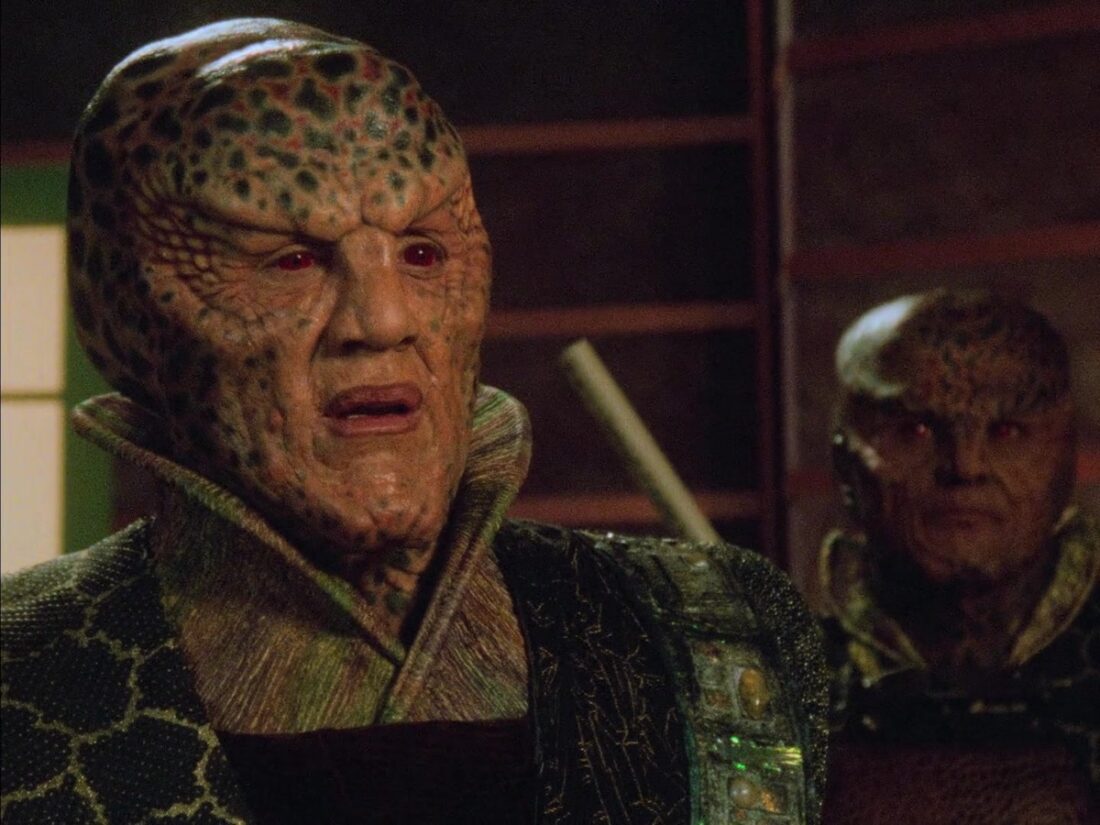
Franklin is frustrated by a Llort patient who is in obvious distress, but with whom he can’t communicate because the translator is late. Plus the answers he needs for the probe are slow to come because the expert on Earth is off on vacation. Franklin snaps at his contact on Earth, and then pops some stims, just like he said he wouldn’t.
Na’Far meets with the Narn on B5, who, as predicted by G’Kar, reject him handily, calling him a traitor. Violence almost erupts, though Ta’Lon is able to maintain the peace by partly unsheathing his sword. When the local Narn express disgust that he would take up arms against a fellow Narn, Ta’Lon points out the Narn with the knife behind his back trying to sneak up on Na’Far. Not wanting Narn to fight against Narn, G’Kar agrees to return to the homeworld.
In CnC, they’re down to their last five questions. Just as they’re about to send those last five, Sheridan orders Corwin to stand by, as something seems wrong to him. Why would they offer cool scientific advances to a species because they already understand science? What if instead they’re testing to see if they’re so smart that they’re a threat?
When they fail to send the answers, the probe just leaves the system, lending credence to Sheridan’s hypothesis that they don’t see them as a threat. Sheridan, though, doesn’t want anyone to fall victim to this, so he sends a mechanical probe with all the answers, downloading them once B5 is out of the prob’s blast radius. Sure enough, it goes boom, thus proving Sheridan’s hypothesis.
Pretty much every Narn on the station—including Ta’Lon—urge G’Kar not to leave the station. Yes, their families will be in danger, but they were already in danger. What they want is to be free, and the only way that’ll happen is if G’Kar stays on B5 to lead the rebellion.
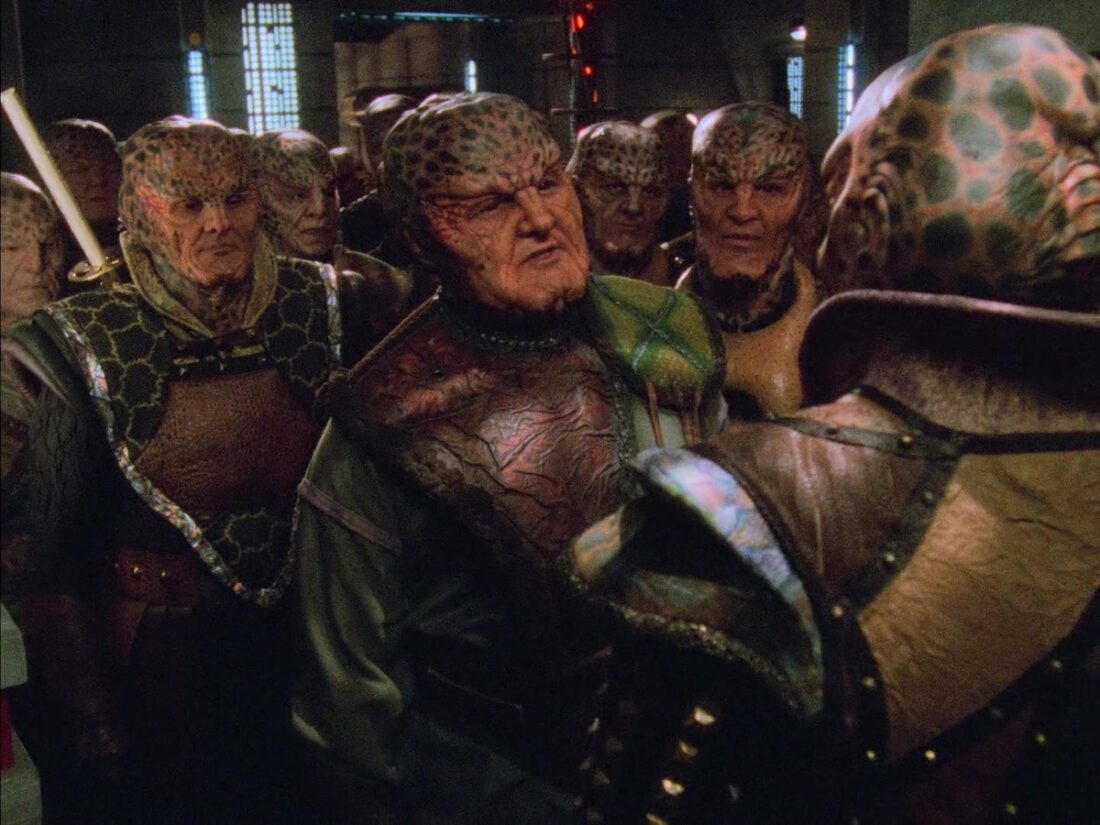
Garibaldi apologizes to Franklin for doubting him. Franklin gives the I-can-stop-anytime speech that all junkies give, and also lies through his teeth and says he got through the entire shift without taking any stims.
Vir goes off to Minbar. He’s not happy about it.
Sheridan and Ivanova once again meet with the transport pilots. It does not go well…
Get the hell out of our galaxy! Sheridan has a nice reunion with Ta’Lon. The Narn says he owes Sheridan a debt he must repay as a matter of honor. Sheridan jokes that he’s not sure what his superiors will say if he starts showing up places with a Narn bodyguard, to which Ta’Lon confidently replies, “They will say, ‘Here is a man who will live to be a hundred and fifty’.”
Ivanova is God. At one point, Ivanova compliments Sheridan on his ability to see the good in any situation. Sheridan’s reply is that if he didn’t, he might end up like her. Ivanova is not amused…
The household god of frustration. As an alcoholic, Garibaldi recognizes that Franklin may be a fellow junkie. But he chooses to believe his friend when he lies to his face and says he has it under control.
If you value your lives, be somewhere else. Delenn disabuses Mollari of the notion that they ever used to be friends, a relationship that pretty much only existed in Mollari’s head. She also agrees to Vir’s reassignment, but cautions Mollari that he may regret it.
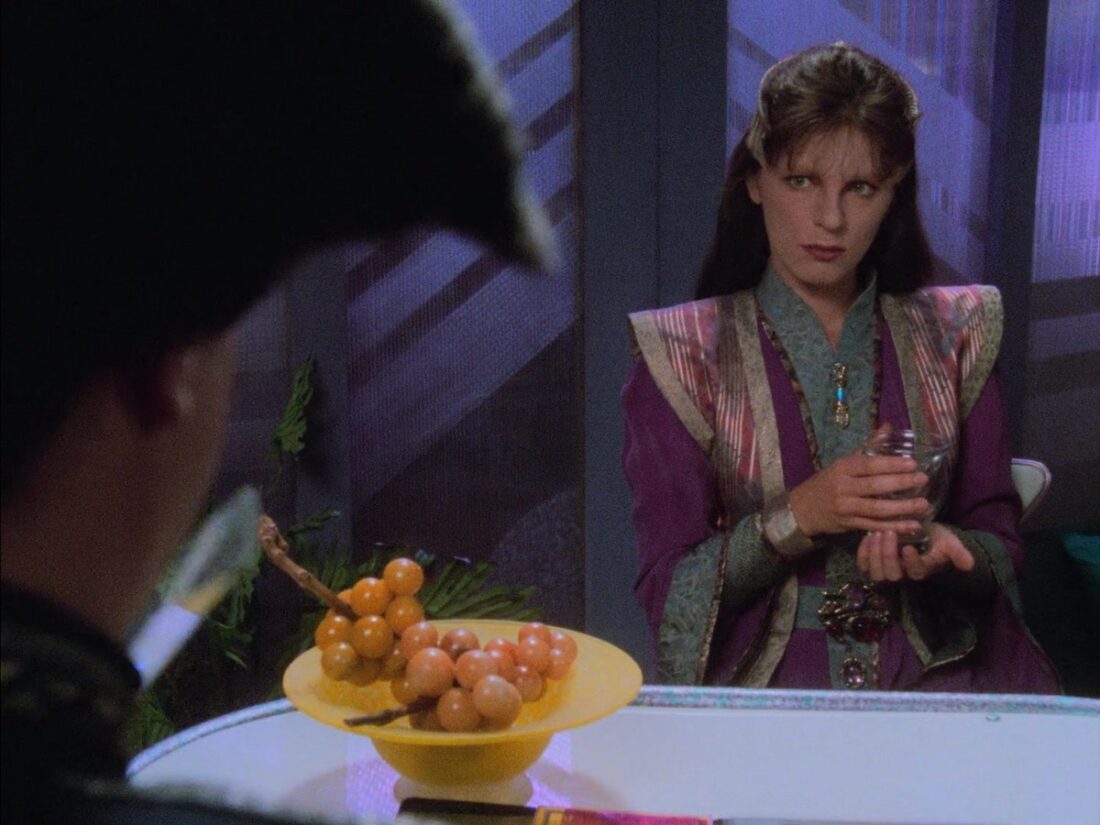
In the glorious days of the Centauri Republic… Mollari makes it clear that he’s gone completely evil as he not only kicks Na’Far while he’s down, but steps on his face while he’s at it. His response to Vir’s expression of disgust is to finally get rid of him, under the pretense of being fond of him and wanting what’s good or his career. (And it is a good career move, truthfully…)
Though it take a thousand years, we will be free. Apparently, if you draw a K’tok sword (which is what Ta’Lon carries), you can’t re-sheathe it until it draws blood. Ta’Lon draws it to show support for G’Kar, and has to bloody his own hand before he can put it away. (He also says to G’Kar: “I carry my sword in my hand. You carry yours in your heart and in your mind. As I see it, that gives you a two-to-one advantage in arms.”)
Welcome aboard. Marshall Teague returns from “All Alone in the Night,” now given a name, Ta’Lon, and officially becoming recurring; he’ll be back in “Point of No Return.” The great Stephen Macht plays Na’Far. Recurring regular Joshua Cox is back from “The Fall of Night” as Corwin, and this is the first time he’s credited with the name he got back in “And Now for a Word” rather than as “Tech #1.” He’ll return in “Voices of Authority.”
Trivial matters. Mollari piloted Delenn and Draal down to Epsilon III in “A Voice in the Wilderness, Part II,” which is the favor Mollari calls on to get Vir reassigned.
According to his online postings, J. Michael Straczynski was inspired to write the probe plot in part by the findings of a House of Representatives science sub-committee that held hearings in the 1970s on the subject of what to do if extraterrestrial life tried to contact us. The conclusion was that we should do nothing, for precisely the reason Sheridan outlines in this episode.
Vir was sent to Minbar at least in part to give Stephen Furst a more flexible schedule to accommodate his co-starring role in the sitcom Misery Loves Company, in which he starred with Christopher Meloni, Dennis Boutsikaris, and the great Julius Carry. (This is more consideration than Andrea Thompson got…) This accommodation would prove to not be needed for long, as the sitcom was cancelled after eight episodes.
The echoes of all of our conversations.
“Corwin, check these figures again. Make sure they came through the translator okay. I don’t want to get killed because of a typo—it will be embarrassing.”
—Ivanova, gathering the answers to the pop quiz.
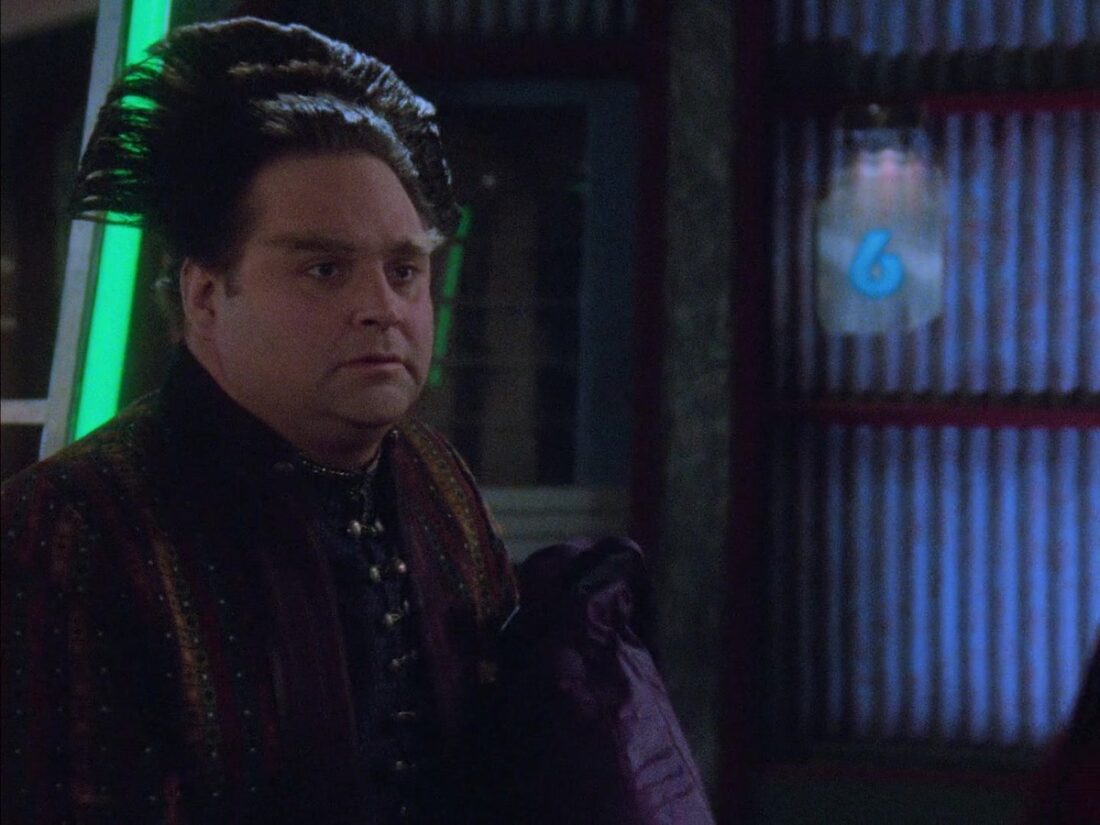
The name of the place is Babylon 5. “We are fighting for our world, Na’Far.” Once again we have stuff with the humans that’s kinda meh, leaving it to the stuff involving the non-humans to actually hold my interest. (Tellingly, the only parts of this episode I remembered from thirty years ago were Vir’s reassignment and all the Narn stuff.)
First we have the Alien Pop Quiz Of Doom, where the first thing I thought of when Corwin explained it, was that it was a bait-and-switch to get rid of the smart competition. Now, I write stories for a living, so I think like that, but still, it’s frustrating when you think of the strategic thing half an hour before the military strategist does.
And I mostly just found the Franklin-Garibaldi plot annoying, mostly because Franklin says everything that every junkie ever says, something Garibaldi, as a cop and as a junkie himself, should recognize. Indeed, his status as an alcoholic is why he knows that Franklin is going down the garden path, as it were. So seeing him let Franklin off the hook is annoying. It doesn’t help that Franklin is mostly a self-righteous ass, which makes it a lot harder to sympathize with him. (Also, he’s in charge of medlab, so he should know how the personnel are allocated. He’s the one who should be asking people to cover shifts, he isn’t the one who should be asked…)
So once again we find ourselves looking to the plotlines involving Mollari and G’Kar for solace, and boy, do they come through. I mentioned last week how you can go from loving Mollari to hating him. This week, you just hate him, which is by way of showing why fobbing Vir off on the Minbari is a spectacularly bad idea. First he kicks poor Na’Far while he’s down, with Na’Far reduced to saying, “You missed a rib.” Then the ambassador explains to an appalled Vir why they have to kick the Narn while they’re down (basically to make sure they don’t get back up).
Mollari then approaches Delenn about taking Vir off his hands, and here in particular Peter Jurasik shines, as Mollari is trying very desperately to fake sincerity. It is to Delenn’s credit that she doesn’t buy his bullshit for a nanosecond, but agrees anyhow, if for no other reason than she probably thinks Vir is better off as far away from Mollari as possible.
Indeed, Mollari thinks the same. Vir is the closest Mollari has to a conscience, and it’s damnably inconvenient. So he gets rid of him. Stephen Furst beautifully plays Vir’s departure like a puppy who’s been inexplicably abandoned by his favorite person.
The Narn end of things also shines. Having a guest star of the calibre of Stephen Macht and his fabulous voice certainly helps. Macht—who was one of the finalists for the role of Jean-Luc Picard back in 1986—gives Na’Far a desperate dignity. He’s not a bad person, he’s just trying to make the best of a bad situation, only to discover that he’s never going to be provided with the materials for that manufacture. Marshall Teague also does excellent work as Ta’Lon, and of course Andreas Katsulas is his usual superlative self. G’Kar has always wanted what was best for his people—sometimes at any price—and we see that writ large here. He’s willing to sacrifice his life (he obviously doesn’t believe Na’Far’s assurance that G’Kar will not be put to death, nor should he) to save others. He only doesn’t because the Narn on the station know the most important lesson: safe is good, free is better.
Next week: “Passing Through Gethsemane.”










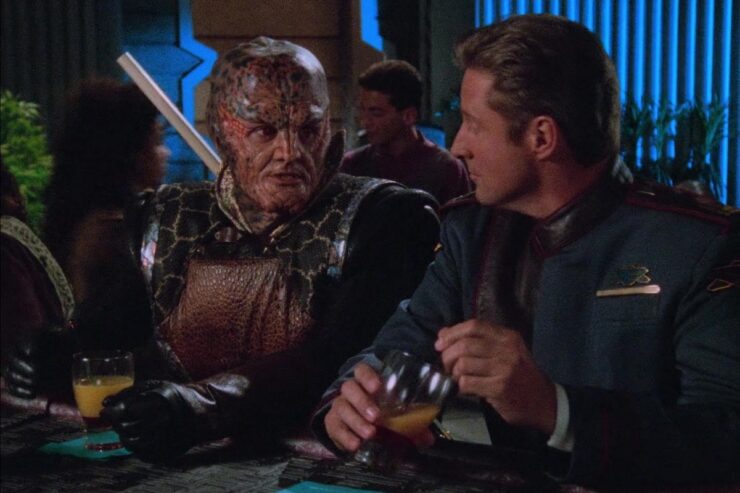
The Brakiri and their issues with comets (alluded to by Garibaldi during his conversation with Franklin) will come up again in Day of the Dead.
The bit at the end about it being better to die free than live as a slave appears to be paraphrased from Declaration of the Causes and Necessity of Taking Up Arms, written by Thomas Jefferson with revisions by John Dickinson.
Riffable moments
Ivanova: So, what do we get if we pass?
A new car!!!!!
Na’far: Citizen G’kar has said the things you want to hear. Focused your anger on blood and revenge and retaliation. All these things will be ours…
If the price is right!
I don’t know if Garibaldi is so much letting Franklin off the hook, as recognizing that continued pressure on the subject would be counterproductive and stepping back to let Franklin process things on his own time. It’s an approach that’s likely based on his own reactions to people telling him he had a drinking problem.
Speaking of the dinner where Garibaldi broached the stims issue, those were absolute mountains of spaghetti that ought to have driven the doctor nuts with the amount of calories. I thought Garibaldi was Italian enough to think of the pasta dish as the appetizer before the main course. And even if the pasta is the main, those were massive portions, even by modern American standards, let alone 30 years ago.
Here in Italy, pasta is not an appetizer but either a first course or a full meal on its own. It’s not unusual for people who do hard manual work to eat even 300g of pasta in one sitting. (Alas, it’s not the suggested ration for a desk worker)
Eating that much spaghetti with garlic bread is definitely overkill, though
My maternal grandparents were immigrants from Sicily. They often served pasta as the main dish at dinner. Not at all unusual.
As someone who was (relatively) newly sober when this aired, and 31years sober now, that’s exactly how I read the conversation. You have to let someone find their own bottom before they can start climbing back up.
Sometimes that bottom is 6 feet down… Almost was for me.
I agree — I read it as Garibaldi choosing not to press the issue rather than buying what Franklin claimed.
And yeah, I did think that was an awful lot of spaghetti, and also a huge amount of garlic bread for just two people. And of course, since it’s a TV episode, they didn’t take a single bite throughout the entire scene. Well, at least they went on to eat after the scene ended, rather than Franklin storming out or something. I was raised never to waste food, so it always bugs me when characters sit down over a whole meal, do a dialogue scene without eating any of it, and then just abandon it there on the table.
Actors tend to absolutely hate scenes where they eat. Even if the food is hot during the first take (not a given), it’s soon cold and unappetizing. Plus if they eat several mouthfuls in each take, they wind up feeling bloated and queasy. Continuity people aren’t too keen on them either when they start with the food freshly plated like in this scene. So the obvious solutions are either to have the meal be over with just a little left on the plate or not have anyone take a bite. Something like Sheridan’s dinner with Delenn is a reasonable compromise. You can’t really see into the bowls, and Boxleitner only had to eat a thin slice of Jello per take (with crunch added in post).
Yes, I know the practical reasons for it, but it still bugs me to see food being left uneaten.
That’s actually something I’ve noticed in the Japanese TV I watch — the eating scenes tend to involve far more actual on-camera eating than they do in American TV. When they have dialogue scenes over food, they’re actually eating the food and talking with their mouths full. There are quite a lot of scenes set in restaurants or at ramen carts or around the dinner table or whatever, perhaps more so than in American TV, and usually, the food is actually getting eaten. Just yesterday (while watching an Ultraman Orb episode where the hero was wolfing down two burgers at once in alternate bites), it occurred to me to wonder if that’s because they shoot quickly and don’t do a lot of retakes, and maybe eating real food on camera is how the actors get fed during a long day of shooting.
That’s how I read Garibaldi’s reaction too. Addict recognize Addict – you can be supportive, try to get them to see it’s NOT under control, but at some point talking/cajoling just doesn’t work anymore and the user will have to find out on their own. When you’re trying to support an addict, you don’t want to burn the bridge by pressing too hard, which is what I think Garibaldi did here. I rewatched the scene a couple of times and Franklin’s CLEARLY lying through is teeth, not doing a good job of it, and I get the distinct impression Garibaldi’s not buying it, but leaving it alone for now.
I always found the notion that Londo offloads Vir now a bit odd, as there was an episode in the second season where he fought to keep Vir at his side. Sure, real world considerations came into it, and perhaps it shows how much further Londo was going down his dark road, but it does seem a little contradictory.
Garibaldi absolutely should have recognized the obvious signs that Franklin was falling deep into addiction. All the signs are there. I struggle to think of a reason why he wouldn’t call out Franklin at this point, but maybe part of him foolishly wants to believe his friend isn’t an addict.
I like the Narn storyline most of all in this episode. G’Kar has been dedicated to keeping up the resistance since the Narn surrender, and one can feel his increasing desperation. Something, somewhere, has to break…and of course it will, soon enough.
Before, wasn’t Londo trying to keep Vir from hurting his career by leaving? Now, he’s trying to help Vir’s career. More fundamentally, though, they’re more at odds now over the dark path Londo’s gone down, so Londo’s either A) trying to get an obstacle out of his way, B) trying to save Vir from being dragged down with him, or probably C) both.
In season 4, there’s a moment when Londo confirms that reason B is a big part of why he sent Vir away to Minbar. Vir reminds him that once he, too, saw the world through far less cynical eyes, and he didn’t want Vir to lose that innocence (as he has).
Setting aside that Vir’s departure was “really” driven by external factors, rather than character dynamics, I choose to interpret Londo’s second response to Delenn as actually sincere, at least to an extent. I think he really does think that Vir will suffer if he stays, and he’s probably not wrong about that. Vir can’t really hide his contempt for Refa anymore, for example, and that is bound to get him into trouble. I think he honestly thinks that Vir will be safer if he’s somewhere he is less likely to make unhealthy enemies. (This doesn’t exactly work out how Londo thinks it will, but we’ll get there when we get there.)
It is also self-serving. But it can be two things.
The name of that alien species, Llort, is “Troll” spelled backward. I doubt it took a lot of time to come up with that one.
I also caught on right away that the probe was lying and would destroy whoever passed the test. Incidentally, that was how Star Trek: “Arena” was supposed to end: The Metron would’ve revealed that they lied about destroying the losing captain’s ship and actually planned to destroy the victor’s ship, as they would be the more dangerous species. So Kirk saved the Enterprise from destruction by sparing the Gorn. But that bit got cut out for time, or perhaps because they wanted Kirk’s action to be less self-serving (whether he knew it or not).
It bugged me the way Corwin was doing the Lt. Uhura hand-on-the-ear thing while listening to the computer translation and relaying it. If it was a verbal report, why not just play it for Ivanova instead of repeating what it said? If he was supposed to be summarizing a longer report, then he spoke too quickly to sell that idea. Or why not stage it as him reading a text report from his console? It just seemed awkward that way.
This episode has always stood out to me for one particular reason: overacting. Characters are either hysterical or shouting dialogue for little reason. You get a lot of that during the Franklin scenes, for obvious reasons. But we also get that with Sheridan himself during his probe deduction piece as well as a lot of the Narn material. We even have calm, mellow Na’Far accusing G’Kar of leading the Narn resistance very loudly. And we have G’Kar just as histrionic: I DIDN’T INVADE NARN! BOMB OUR WORLD WITH ASTEROIDS! LEVEL OUR CITIES!
I wonder if that was intentional in the script or a possible tone misinterpretation from director David Eagle. It feels too coincidental that we have no less than four characters shouting in scenes.
Only the Franklin scenes and maybe G’Kar blowing up at his fellow Narn for resorting to violence against Na’Far feel justified in their loud volume. Now that is a truly great scene. That G’Kar line about his fellow Narn harassing each other’s throats stings like nothing else. And the Narn asking G’Kar to stay is a nice payoff to the way their relationship has evolved since season 2’s “Acts of Sacrifice”.
My biggest peeve with this one however is the final countdown for the probe. Sheridan and Ivanova are going back and forth over whether it’s the right decision to send the answers or not, all the while Corwin is giving them the remaining time. They go from 3 minutes to 2 minutes, to 1 minute, to 15 seconds, to timeout in about……… 90 seconds, give or take. I’m not expecting Babylon 5 to be as rigid about real-time storytelling in 1995 as 24 would be six years later. But hey, doing a continuous scene involving a ticking time bomb that ends up missing the mark over a full minute? Maybe, just maybe pay attention to the editing next time?
To me, Londo was both wanting to keep Vir safe from political harm and also get rid of him for his own sake. When he says he has grown fond of vir, I believe every word of it, just as I believe when he calls him an inconvenience. Either way, I adore that scene between him and Delenn. And that scene between him and Na’Far is just brutal.
And I just realized the transports association piece that starts and bookends the episode is a bit of a retread from season 1’s dockworkers strike. But given that was a Sinclair situation, I’m glad we got to see Sheridan’s handling of things as he bluffs his way through the angry mob with that PPG.
According to the closed-captioning transcript, G’Kar’s line is “Look at yourselves. We’re at each other’s throats!” “Harassed” is used only by Na’Far speaking to G’Kar in an earlier scene and G’Kar speaking to Garibaldi in a later scene, in reference to what the Centauri will do to the families back on Narn if G’Kar doesn’t surrender.
I find that TV shows and movies getting the timing on countdowns wrong is more the rule than the exception. Drama always outweighs accuracy in the editing process. (Also, it’s always puzzled me that when actors count down seconds in TV or movies, they almost always count slower than they should. I guess it’s for added dramatic tension, but it’s weird.)
Good catch. My memory is playing tricks. I had “harassing” in mind because of my memory of taping this episode on VHS in the 1990s when the audio quality wasn’t that good and my english wasn’t quite there yet (even though I rewatched the show again and again later on DVD and streaming).
I wasn’t so crazy about the confrontation. Going face to face with any loudmouth yahoo who pipes up at a town hall is eventually going to go poorly. Besides, the pilot’s complaint was absurd; yes, Sheridan and Babylon 5 are trying to control the weapons. As the government, they’re attempting to claim a monopoly on the legitimate use of violence. That’s what a government is. If the pilot doesn’t like that, then they’re welcome to not use Babylon 5. Given Babylon 5’s massive unsolved crime problem, I would have sympathetic to the notion that they want to be armed because the criminals are already armed, but nobody actually raises this point.
The episode also has what I consider to be one of the funniest lines in any show:
LONDO (selling Vir): He wouldn’t even spy on your government. He would consider it…. rude.
Yeah, Mollari really summed Vir up as a character with that one line.
—Keith R.A. DeCandido
I also love the Narn and Centauri bits in this episode. Excellent Narn guest cast as well. Marshal Teague is a favorite of mine and Macht is great here.
Bobby
Keith, I always gave Londo a bit more credit for pushing Vir out.
You show this moment as cementing closed his last open point of vulnerability to morality, going “completely evil.” I think of this instead as a last bittersweet act before surrendering to what he sees as his inevitable role bringing about the New Order.
I understand the psychological logic and the story logic in seeing it your way, and you make a convincing case-thanks. But I think that by seeing this instead as a last gesture of rueful benevolence, we add weight to his upcoming fall fully into Greek level tragedy. If you read it my way, you can see Delenn as knowing Londo better than he knows himself–so far.
One of his flaws is that he thinks he knows himself, even when he doesn’t, really. Only when he later fully faces what a monster he has become is his fall complete. He’s not there yet, IMHO.
I don’t think our interpretations are mutually exclusive. People are complicated, after all……
—Keith R.A. DeCandido
I recently came across a fanfic in which a character points out that she can stop smoking any time she likes, instantly.
With a pistol.
It’s a true remark, as far as it goes….
https://archiveofourown.org/works/4249794/chapters/9617619#workskin
Honestly, I see Londo’s wish to get rid of Vir is a little bit of both of him being sincere and believing his own lie that he doesn’t need Vir. He knows that he is on a unredeemable path now, and that Vir’s innocence is in danger. I think Londo does see this as a way to protect him.
on a side note, thus starts the semi running joke about T’lon’s sword never being sheathed without first drawing blood. Poor T’lon’s hand.
Personally I think he should have taken his glove off first.
Then the makeup artists would’ve had to spend extra time and money making up his hand to look Narnish. (Narnian?)
Yeah, as soon as they said that about the sword, I thought, “Oh, no, they’re going to do that annoying stage effect where he slashes open his palm.” I think I’ve already complained in this review series about my problems with that trope. Couldn’t he have just pricked a finger?
Or made a small cut across his upper thigh. There is a lot of muscle there, and no tendons, major nerves, or large blood vessels to hit (at least not on us humans).
As I mentioned last time this came up, I’ve read that the best place would be the inside of the forearm, for the same reasons that nurses usually draw blood from there. I think I’ve only seen it done that way once in fiction, though.
I forgot this was the episode where Garibaldi reveals he did a “background check” on Sheridan when he came aboard.
I’ve never been a fan of the scene with the townhall, but this time round I found myself thinking of it in terms of last week’s example of Sheridan going up against the bomber and start to wonder if this is about building up the idea of Sheridan having some kind of deathwish, or at least overwillingness to resolve situations through physical confrontation. It smacks a little of holdover elements of what would have been Sinclair’s arc originally given Sinclair had a bit of a deathwish early on (I have strong thoughts on how it being Sheridan and not Sinclair lets some of the air out of what happens with Garibaldi later on) but does start to give us a glimpse of the arrogance in Sheridan that will come into play later on and will repeat in at least of one of his big victories. He becomes a little less the consistently grinning, spotless superman he’s mostly been up to date because he becomes a punching down bully more than a statesman here.
I wonder if Londo’s change is speeded by his experience with G’Kar from the previous episode. While G’Kar’s rejection of Londo was completely justified, it is interesting that Londo becomes more extreme in his treatment of the Narn and pushes Vir away after that experience.
There are definitely points along Sheridan’s future arc that feel like they would have resonated more had it been Sinclair. I think it all still works as it panned out, but I think it’s one of those situations where the stitching shows.
Random thoughts I had while watching this episode:
One day I need to learn how to whistle like that.
Given that opening scene, I probably don’t want to know how Sheridan handled those Mars Riots.
The way Mollari went from savoring executions to mourning the man he used to be gave me whiplash, but in a good way.
Once again, Franklin demonstrates that he’s the last man on the station who should be running Medlab.
The probe plot felt like bog standard science fiction. I’m not sure why they even bothered to include it.
Stephen Macht has to be the best guest star this show’s had in a while. His scenes with Andreas Katsulas are terrific.
As for Katsulas himself, this is one of my favorite performances he’s given so far, and that’s saying something.
I never would have imagined when I first saw Vir that I’d actually feel sorry when he left the station.
“The probe plot felt like bog standard science fiction. I’m not sure why they even bothered to include it.”
Because the idea was to throw a whole bunch of problems at the cast at the same time, hence “A Day in the Strife.” So you had a physical threat to the station to deal with on top of all the personal and political problems going on.
Plus it’s basically an action-adventure series, so there was probably studio pressure to put some kind of physical danger and ‘splosions and stuff in an episode that would otherwise have just been people talking. This happened in Star Trek a lot, with the action/danger plots often being quite tacked on to stories that had nothing to do with them (TNG: “Cost of Living” being an extreme example).
Yeah, but since most of the people on the station didn’t even know it was going on, it felt almost entirely disconnected from the rest of the plot. When Franklin was shouting about how everyone on the station was about to die, and one of his doctors was like “You okay?” I just rolled my eyes.
As I said, I think that was kind of the point — the command crew having to deal with a bunch of different, unrelated crises piling onto them at the same time. It’s a format other TV episodes have done from time to time. I’m sure there’s at least one M*A*S*H episode like that.
And Franklin’s colleague was worried about him because of his uncharacteristic anger and lack of self-control, which we were supposed to recognize as a symptom of stim withdrawal. It wasn’t about what he said, but the way he said it.
I know why she was worried about him. That was as subtle as a sledgehammer.
I was rolling my eyes about the fact that she wasn’t worried about herself, nor did the person he was chatting with seem terribly bothered, either about the prospects of a massive loss of life. The scene effectively communicated how frayed he was, but it didn’t make any sense on any other level. All it did was add to my perception of the bomb plot as pointless.
Yeah, it’s the way he said it and the way he snapped is what gives the clue he’s not quite right at that point.
But the way the script builds to that explosion also feels a bit staged. The Earth-based female doctor tells him that Dr. Mueller is on vacation as an excuse, which is the last thing you want to say to anyone who’s on a space station about to be blown to pieces because of their inability to find the guy. So in a way, I feel almost sympathetic to Franklin’s outburst. He may be abusing stims, but he has no reason not to be rude to the incompetent Earth-based personnel when they’re under an alien probe’s ticking clock.
And the episode failed to anticipate the interconnectedness of the online era, in that it assumes someone who’s on vacation is unreachable. Although I guess he could’ve chosen to leave his devices behind to get away from it all, or something.
Come to think of it, it’s weird that the station computers contain a complete catalog of obscure historical information right down to Sebastian’s street address in 1888 London, yet don’t contain up-to-date scientific research.
Cutting edge scientific research is often isolated in some corporate or academic closed system. And since they had to run down one particular guy, not just his assistants, it may not even be stored in a complete form anywhere. His coworkers may be all working on one piece of a puzzle only he understands. Not good practice for preserving knowledge, but it helps to have that leverage when he chooses how to to monetise it.
Another thing I don’t get is why they didn’t ask any of the older civilizations like the Minbari and Centauri if they knew the answers. JMS answered that question online by saying the ambassadors wouldn’t have known and would’ve had to consult their homeworlds anyway, but there are plenty of other Minbari and Centauri living or working on the station, and any number of them might have scientific training.
Indeed. And yes, he could have deliberately left himself unreachable on vacation. Which is why the doctor’s response to Franklin should have been something like: “We’re doing everything we can to reach him“. Then Franklin could have gone along the lines of “That’s not good enough“, and then the ensuing outburst would have been out of line, prompting the worried looks from his MedLab colleagues.